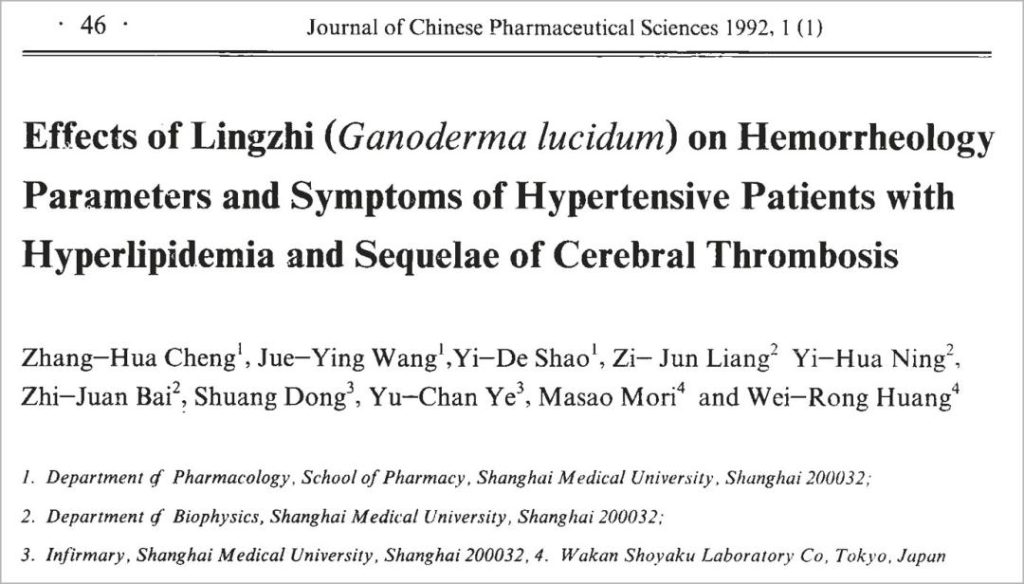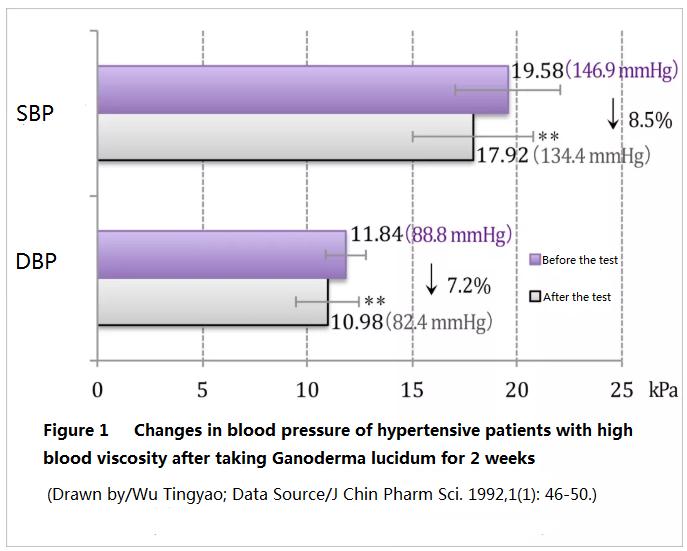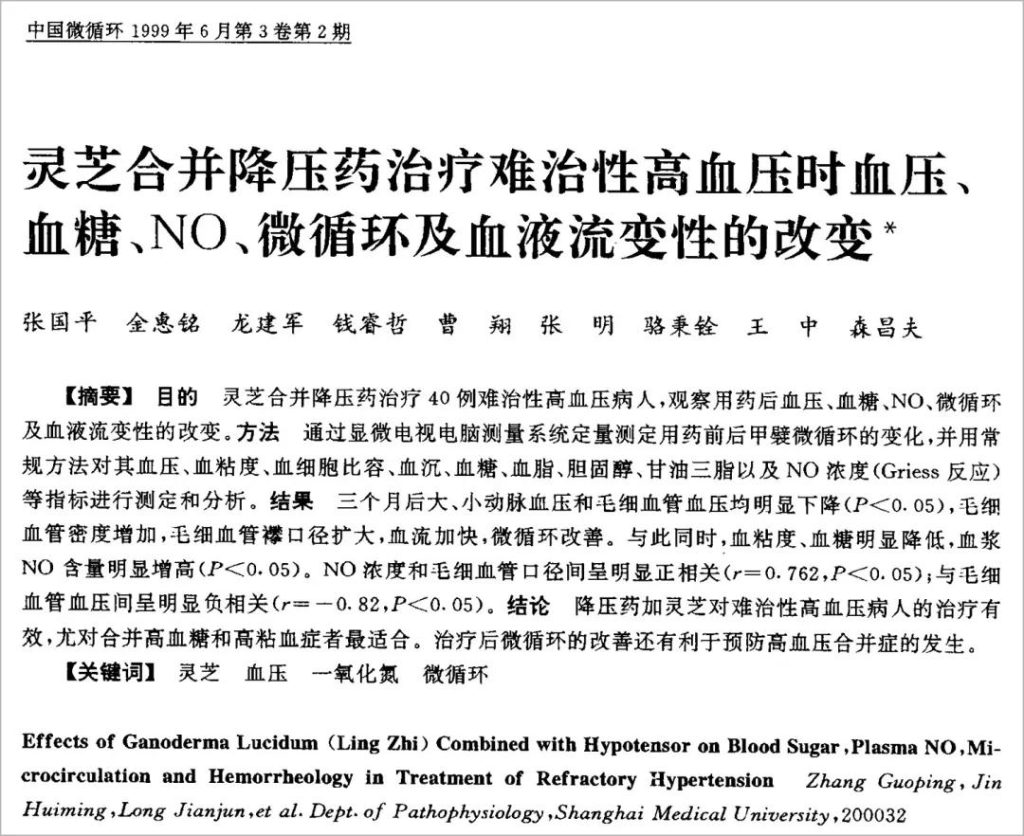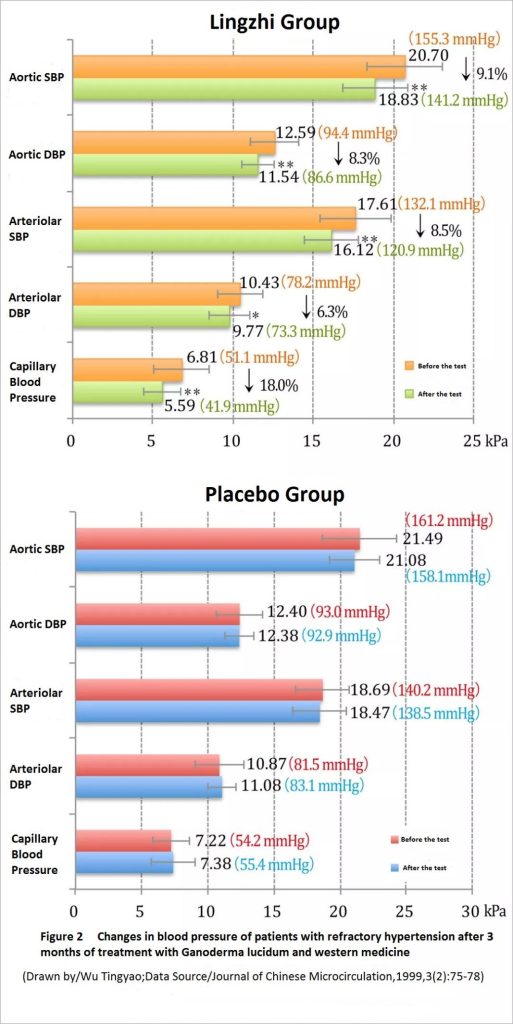Wu Tingyao

Whether used alone or in combination, Lingzhi (also called Ganoderma lucidum or Reishi) has the effects of regulating blood pressure, reducing subjective symptoms and improving blood lipids. Moreover, long-term use of Lingzhi will not cause negative effects on body functions. For details, see “Clinical tests 50 years ago have confirmed that Lingzhi can improve hypertension” and “Clinical studies have confirmed that Lingzhi improves high blood pressure but does not affect normal blood pressure”.
However, Lingzhi not only has the above benefits for hypertension but also improves the blood viscosity, microcirculation (blood circulation of capillaries), blood sugar and insulin resistance in hypertensive patients. Even without affecting blood pressure, it can promote microcirculation and increase blood perfusion in healthy people.
Lingzhi improves blood pressure in hypertensive patients with high blood viscosity.

In 1992, Shanghai Medical University and Wakan Shoyaku Laboratory Co jointly published a clinical report in the “Journal of Chinese Pharmaceutical Sciences”, which analyzed the benefits of eating Lingzhi on patients with both cardiovascular diseases and high blood viscosity. A total of 33 subjects (45 to 86 years old) were tested, and 17 of them had hypertension.
They took 2 Lingzhi tablets (containing 110 mg of Lingzhi fruiting body water extract, equivalent to 2.75 g Lingzhi fruiting body) per day. After 2 weeks, more than half of the subjects improved their symptoms such as headache, dazzle, numbness of the limbs, chest tightness and insomnia; for people with high blood pressure, the systolic and diastolic blood pressure decreased by 12.5 mmHg (8.5%) and 6.4 mmHg (7.2%), respectively, which is a statistically significant difference compared to before the test (Figure 1).

Blood pressure can be affected by heart rate (the number of times the heart beats per minute at rest) and is also positively correlated with blood viscosity (blood flow resistance).
Since all the subjects (including those with normal blood pressure) had no significant difference in heart rate before and after the test (74 times→77 times), they were all in the normal range, but the blood viscosity was significantly reduced. Therefore, it is speculated that the reason why Lingzhi can lower the high blood pressure may be related to the improvement of blood viscosity.
Lingzhi improves difficult-to-treat high blood pressure and also improves blood viscosity and microcirculation.
To further confirm that there is a relationship between the improvement of high blood pressure by Lingzhi and the improvement of blood viscosity, the team from Shanghai Medical University and Wakan Shoyaku Laboratory Co, in collaboration with the Fourth People’s Hospital of Xuzhou City, used the same Lingzhi preparations as in the above study to conduct a randomized (grouped), double-blind (both the investigators and the subjects did not know which group the subjects were assigned to) and placebo-controlled clinical test in patients with refractory hypertension.

According to the researcher’s paper published in “Journal of Chinese Microcirculation” in 1999, the “refractory hypertensive patients” who participated in the clinical test included patients with essential hypertension who received the treatment of captopril (angiotensin converting enzyme inhibitor) or nimodipine (calcium antagonist) for more than one month but their blood pressure still exceeded 140/90 mmHg.
The average age of the subjects was 57.8 ± 9.6 years, and the male to female ratio was about 2:1. During the test, the patients who originally took western medicine took western medicine as usual. The placebo group (13 cases) took placebo every day while the Lingzhi group (27 cases) took 6 Lingzhi tablets every day (containing 330 mg Lingzhi fruiting body water extract), which is equivalent to 8.25 g of Lingzhi fruiting body; this dose is 3 times that of the aforementioned clinical test published in 1992).
(1) Overall improvement in blood pressure
After 3 months of test, the blood pressure of the Lingzhi group, whether it is aortic blood pressure (measuring the arm), arteriolar blood pressure (measuring the finger) or capillary blood pressure (measuring the nail fold-the skin fold bordering the lower edge of the nail and covering the root of the nail) were significantly lower than before the test, but there was no significant change in the placebo group (Figure 2).

(2)Blood viscosity also decreased
At the same time, the main indicators for evaluating blood viscosity, including high shear rate (fast blood flow speed) whole blood viscosity, low shear rate (slow blood flow speed) whole blood viscosity and plasma viscosity that affects whole blood viscosity (the blood viscosity after removal of blood cells, which is affected by the content of protein, fat and blood sugar), decreased significantly in the Lingzhi group while the placebo group stayed in place (Figure 3).



